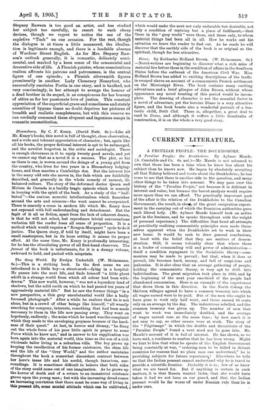A PECULIAR PEOPLE: THE DOUKHOBORS.
A Peculiar Peoplq: the Doukhobars. By Aylmer Maude. (A. Constable and Co. Os. net.)—Mr. Maude is not ashamed to own that there has been a time when he knew less about his subject than he knows now. He began by absolutely accepting all that Tolstoy believed and wrote about the Doukhob6rs ; he has• come to see that there is another side to the question, and many. other things to be taken into account. We may pass over the history of the "Peculiar People," not because it is deficient in interest and value, but because the barest analysis would require more space than we can afford. The practically important part of the affair is the relation of the DoukhobOrs to the Canadian Government, the result, in shoat, of the great emigration experi- ment in the carrying out of which the Dominion authorities gave such liberal help. (Mr. Aylmer Maude himself took an active part in the business, and he speaks throughout with the weight of personal experience.) The difficulties that beset all attempts at practically realising communistic principles soon made them- selves apparent when the Doukhob6rs set to work in their new home. It would be rash to draw general conclusions, at least with the belief that they are matters of demon- stration. Still, it seems tolerably clear that where there is a leader of commanding will and power of administration— itself a condition repugnant tq the Socialistic theory—com- munism may be made to prevail ; but that, when it does so prevail, life becomes hard, uneasy, and full of suspicions and jealousies. It is also clear that an average gathering of people; holding the communistic theory, is very apt to drift into individualism. The great migration took place in 1899, and by the beginning of the next year one-third of the people had abandoned communism. Here is an example of the experiences that drove them in this direction. In the North Colony the thirteen villages agreed to have a common treasury into which all wages earned were to be paid. But of the men who ought to have gone to work only half went, and these earned 56 cents only on an average by the day. The industrious rebelled, and the common treasury was given up. The number of men that went to work was immediately doubled, and the average of wages earned rose at the same time ; by how much it is not easy to say, as other causes were at work. The story of the "Pilgrimage" in which the doubts and discontents of the "Peculiar People" found a vent need not be gone into. Mr. Maude's account of it is full of interest. He has shown, as we have said, a readiness to confess that he has been wrong. Might we hint to him that when he speaks of the English Government being constantly at war, "ordering men to be killed in distant countries for reasons that no plain man can understand," he is providing subjects for future repentance,? Elsewhere he tells us that the Indian peasant cannot understand why he is ,taxed to provide a scientific frontier. Probably it is so ; few of us know what we are taxed for. But if anything is certain in such matters, it is that Russia wanted India, that she would have taken it had we not been on our guard, and that the Indian peasant would be far worse off under Russian rule than he is under ours.










































 Previous page
Previous page